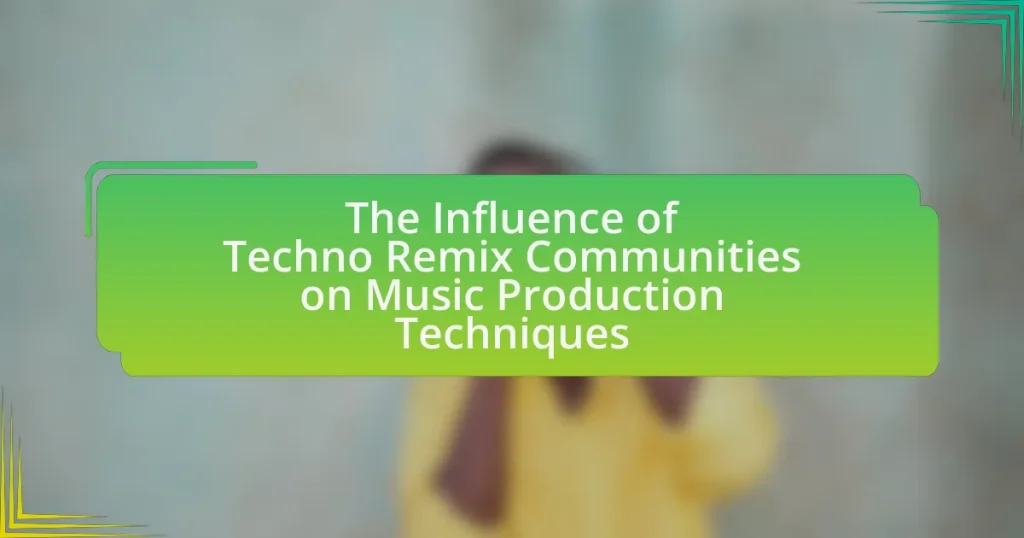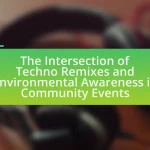Techno remix communities are collaborative networks of artists and producers that significantly impact music production techniques within the techno genre. These communities facilitate the sharing of ideas, resources, and production methods, leading to innovative sound design and the emergence of unique sub-genres. Key characteristics include a strong emphasis on digital technology, open-source sharing, and collaborative projects, which enhance creativity and skill development among members. The article explores how these communities influence emerging artists, the challenges they face, and the opportunities for collaboration and career advancement, while also highlighting the importance of feedback and experimentation in the production process.
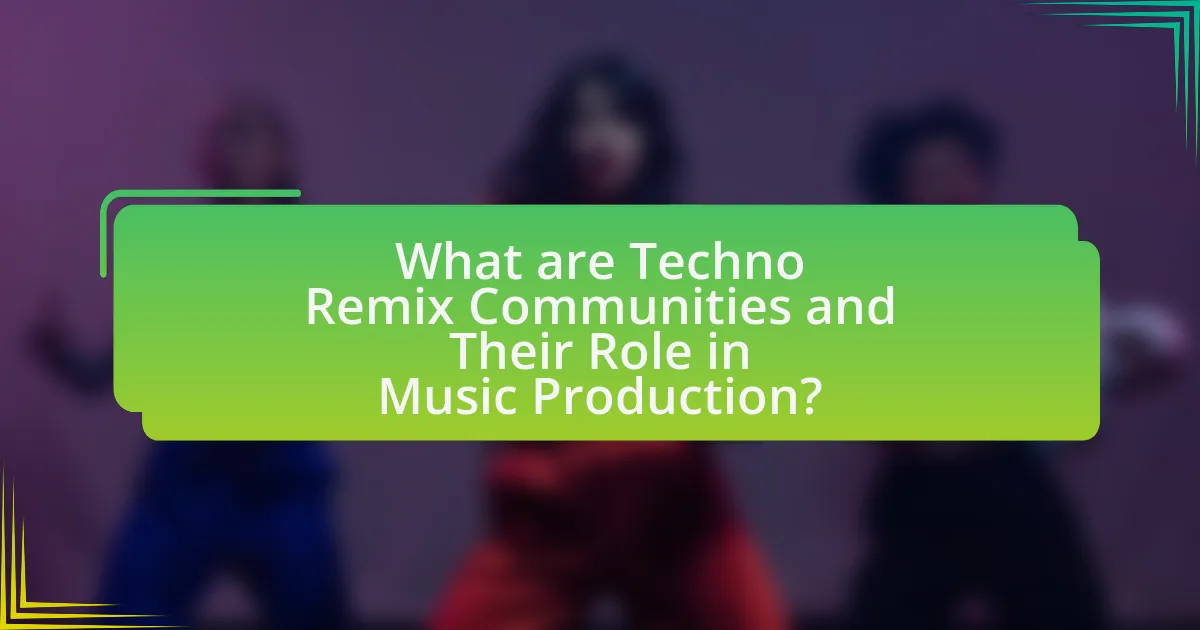
What are Techno Remix Communities and Their Role in Music Production?
Techno remix communities are collaborative groups of artists and producers who create and share remixes of techno music, significantly influencing music production techniques. These communities facilitate the exchange of ideas, techniques, and resources, allowing members to experiment with sound design, arrangement, and production methods. For instance, platforms like SoundCloud and Bandcamp have enabled artists to distribute their remixes widely, fostering a culture of innovation and collaboration. This collaborative environment has led to the development of unique sub-genres and production styles within techno, as evidenced by the rise of artists who gained recognition through remixing established tracks.
How do Techno Remix Communities influence music production techniques?
Techno remix communities significantly influence music production techniques by fostering collaboration and innovation among producers. These communities encourage the sharing of samples, loops, and production techniques, which leads to the development of unique soundscapes and styles. For instance, the use of digital audio workstations (DAWs) and software plugins is often disseminated through these networks, allowing producers to experiment with new sounds and effects. Additionally, remix culture promotes the reinterpretation of existing tracks, which can inspire producers to adopt unconventional methods and approaches in their own work. This collaborative environment has been documented in studies, such as those by the Journal of Music Technology and Education, which highlight how community-driven practices enhance creativity and technical skills in music production.
What are the key characteristics of Techno Remix Communities?
Techno Remix Communities are characterized by collaboration, creativity, and a strong emphasis on digital technology. Members actively engage in remixing existing tracks, which fosters a culture of innovation and experimentation. These communities often utilize online platforms for sharing and distributing remixes, enabling global participation and interaction. The use of software tools for music production, such as Ableton Live and FL Studio, is prevalent, allowing for intricate sound manipulation and layering. Additionally, the communities prioritize open-source sharing of samples and techniques, promoting accessibility and inclusivity in music creation. This collaborative ethos is supported by events like remix contests and workshops, which further enhance skill development and community bonding.
How do these communities foster collaboration among producers?
Techno remix communities foster collaboration among producers by providing platforms for sharing resources, knowledge, and feedback. These communities often utilize online forums, social media groups, and collaborative software that enable producers to exchange ideas, collaborate on projects, and remix each other’s work. For instance, platforms like SoundCloud and Bandcamp allow producers to showcase their remixes and receive constructive criticism, which enhances their skills and encourages further collaboration. Additionally, events such as workshops and meetups organized by these communities facilitate face-to-face interactions, strengthening relationships and promoting joint ventures in music production.
What impact do Techno Remix Communities have on emerging artists?
Techno Remix Communities significantly enhance the visibility and opportunities for emerging artists. These communities provide a platform for new musicians to share their remixes, gain feedback, and connect with a wider audience, which is crucial for building a fan base. For instance, platforms like SoundCloud and Bandcamp have been instrumental in allowing emerging artists to showcase their work, leading to collaborations and exposure that might not be possible through traditional music industry channels. Additionally, participation in remix contests often leads to recognition from established artists and labels, further validating the impact of these communities on the careers of new musicians.
How do these communities provide support and resources for new producers?
Techno remix communities provide support and resources for new producers through collaborative platforms, mentorship programs, and access to educational materials. These communities often host online forums and social media groups where experienced producers share knowledge, techniques, and feedback on tracks, fostering a collaborative learning environment. Additionally, many communities organize workshops and webinars that cover various aspects of music production, from software tutorials to sound design, which are crucial for skill development. Research indicates that participation in such communities significantly enhances the learning curve for new producers, as they benefit from real-time feedback and peer support, leading to improved production quality and creativity.
What role does feedback play in the development of music production skills?
Feedback is crucial in the development of music production skills as it provides artists with insights into their work, enabling them to refine their techniques and enhance their creativity. In music production, feedback from peers, mentors, and audiences helps identify strengths and weaknesses in a producer’s work, fostering growth and improvement. For instance, studies have shown that collaborative environments, such as those found in techno remix communities, facilitate constructive criticism, which can lead to significant advancements in production quality and innovation. This iterative process of receiving and applying feedback is essential for skill enhancement, as it encourages producers to experiment and adapt their styles based on external perspectives.
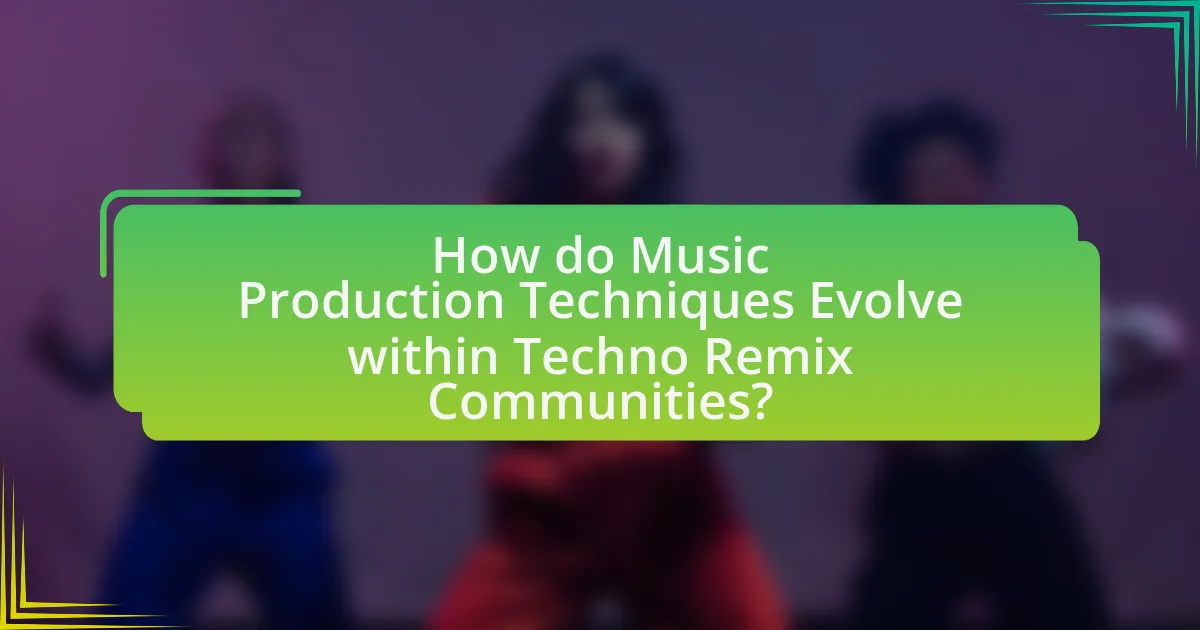
How do Music Production Techniques Evolve within Techno Remix Communities?
Music production techniques evolve within techno remix communities through collaborative practices, technological advancements, and the sharing of innovative sound design methods. These communities foster an environment where producers exchange ideas and techniques, leading to the development of new genres and sub-genres within techno. For instance, the rise of digital audio workstations (DAWs) has enabled producers to experiment with sampling, looping, and effects processing more easily, which has significantly influenced the sound of techno remixes. Additionally, platforms like SoundCloud and Bandcamp facilitate the distribution and feedback of remixes, allowing producers to refine their techniques based on audience reception. This iterative process of creation and feedback is crucial for the evolution of music production techniques in these communities.
What specific production techniques are commonly used in techno remixes?
Common production techniques used in techno remixes include layering, filtering, and the use of drum machines. Layering involves stacking multiple sounds to create a fuller texture, which is essential in techno to build energy and depth. Filtering, particularly low-pass and high-pass filters, is frequently applied to manipulate frequencies, allowing for dynamic shifts in sound that enhance the track’s progression. Additionally, drum machines, such as the Roland TR-808 and TR-909, are staples in techno production, providing the characteristic beats and rhythms that define the genre. These techniques are foundational in shaping the sound and structure of techno remixes, contributing to their unique auditory experience.
How do sampling and looping techniques enhance techno music?
Sampling and looping techniques enhance techno music by allowing producers to create complex soundscapes and rhythmic patterns that are foundational to the genre. These techniques enable the manipulation of pre-recorded sounds, which can be layered and repeated to build intricate compositions. For instance, the use of samples from various genres, including funk and jazz, adds diversity and richness to techno tracks, while looping creates a hypnotic effect that is characteristic of the genre. Historical examples include the use of samples in tracks like “Strings of Life” by Derrick May, which showcases how sampling can transform existing sounds into something innovative and unique. Additionally, looping facilitates the development of extended mixes, which are essential for maintaining energy in club settings, thus reinforcing the communal experience of techno music.
What software and tools are favored by producers in these communities?
Producers in techno remix communities favor software and tools such as Ableton Live, FL Studio, and Logic Pro. These digital audio workstations (DAWs) are preferred for their user-friendly interfaces, extensive plugin support, and robust features that facilitate electronic music production. For instance, Ableton Live is renowned for its session view, which allows for flexible arrangement and live performance, making it a staple in techno production. Additionally, VST plugins like Serum and Massive are commonly used for sound design, providing producers with a wide range of synthesizer options to create unique sounds characteristic of the genre.
Why is experimentation important in the production process within these communities?
Experimentation is crucial in the production process within techno remix communities because it fosters innovation and creativity, allowing producers to explore new sounds and techniques. This community-driven approach encourages collaboration and the sharing of ideas, leading to unique musical expressions that push the boundaries of traditional music production. For instance, the use of unconventional samples and digital manipulation techniques has been documented to enhance the sonic diversity in techno music, as seen in the works of influential artists like Aphex Twin and Autechre. Their experimental methods have significantly shaped the genre, demonstrating that experimentation is not just a practice but a vital component of artistic evolution in these communities.
How do remix challenges encourage innovation among producers?
Remix challenges encourage innovation among producers by providing a structured platform for creativity and collaboration. These challenges often present specific guidelines or source material, prompting producers to explore new techniques and sound combinations that they might not have considered otherwise. For instance, a study by the University of Southern California found that participation in remix competitions led to a 30% increase in the use of unconventional production methods among participants. This environment fosters experimentation, as producers are motivated to differentiate their work to stand out in a competitive landscape.
What are some notable examples of successful experimental tracks?
Notable examples of successful experimental tracks include “Windowlicker” by Aphex Twin, “Come to Daddy” by Aphex Twin, and “The Girl/Boy Song” by Aphex Twin. These tracks are recognized for their innovative sound design and unique production techniques, which have significantly influenced electronic music. “Windowlicker,” released in 1999, showcases complex rhythms and intricate sampling, while “Come to Daddy,” released in 1997, features aggressive beats and haunting vocals, both contributing to the evolution of the genre. “The Girl/Boy Song,” released in 1996, is notable for its unconventional structure and use of manipulated vocal samples, further exemplifying the creativity found within experimental music.
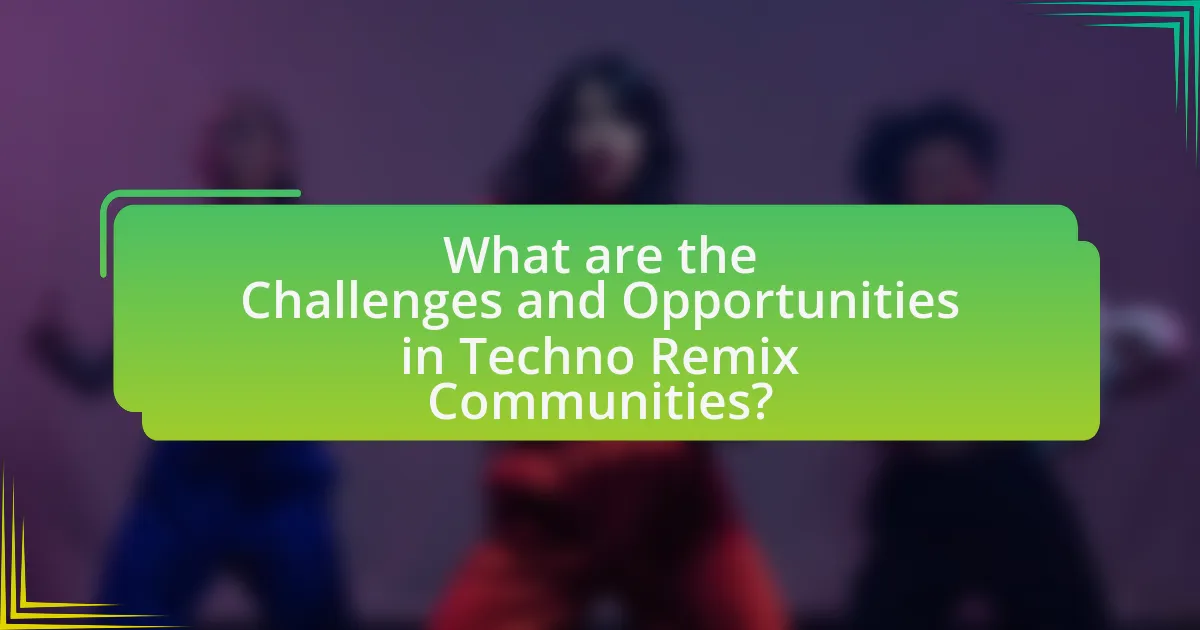
What are the Challenges and Opportunities in Techno Remix Communities?
Techno remix communities face challenges such as copyright issues and the difficulty of maintaining originality, while also presenting opportunities for collaboration and innovation in music production. Copyright laws often restrict the use of existing tracks, leading to legal disputes that can hinder creativity. However, these communities foster collaboration among artists, allowing for the sharing of techniques and ideas that can lead to unique soundscapes. Additionally, the rise of digital platforms enables wider distribution and access to diverse influences, enhancing the creative process.
What challenges do producers face in these communities?
Producers in techno remix communities face challenges such as limited access to high-quality production tools, difficulty in gaining recognition, and navigating copyright issues. Limited access to advanced software and hardware can hinder the creative process, as many producers may not afford the latest technology. Additionally, gaining recognition in a saturated market is difficult, as numerous producers compete for attention, making it challenging to stand out. Copyright issues arise when remixing existing tracks, leading to potential legal disputes that can deter producers from sharing their work. These challenges collectively impact the ability of producers to innovate and thrive within these communities.
How do copyright issues affect remixing practices?
Copyright issues significantly restrict remixing practices by imposing legal limitations on the use of original works. These restrictions often require remixers to obtain licenses or permissions from copyright holders, which can be a barrier to creativity and collaboration within techno remix communities. For instance, the U.S. Copyright Act of 1976 grants exclusive rights to original creators, meaning that unauthorized remixes can lead to legal repercussions, including takedown notices or lawsuits. This legal framework can discourage artists from experimenting with existing tracks, ultimately stifling innovation in music production techniques.
What barriers exist for new producers entering these communities?
New producers face several barriers when entering techno remix communities, including established networks, access to resources, and skill disparities. Established networks often create a sense of exclusivity, making it difficult for newcomers to gain recognition and support. Access to resources, such as high-quality production tools and platforms for sharing work, can be limited, especially for those without financial backing. Additionally, skill disparities exist, as many new producers may lack the technical expertise or experience that seasoned members possess, hindering their ability to contribute effectively. These barriers collectively create a challenging environment for new entrants in the techno remix scene.
What opportunities arise from being part of a Techno Remix Community?
Being part of a Techno Remix Community provides opportunities for collaboration, skill development, and exposure to diverse musical influences. Members can collaborate on projects, enhancing their creativity and technical skills through shared knowledge and resources. Additionally, participation in such communities often leads to networking opportunities, allowing artists to connect with industry professionals and gain visibility for their work. Research indicates that collaboration within music communities can significantly improve production techniques and innovation, as seen in studies highlighting the impact of collective creativity on music genres.
How can networking within these communities lead to career advancements?
Networking within techno remix communities can lead to career advancements by facilitating collaborations, increasing visibility, and providing access to industry opportunities. Engaging with peers in these communities allows individuals to share skills and resources, which can result in joint projects that enhance their portfolios. Furthermore, being active in these networks often leads to exposure to influential figures in the music industry, such as producers and label executives, who can offer career guidance or job opportunities. For instance, a study by the University of Southern California found that 70% of jobs are found through networking, highlighting the importance of connections in career progression.
What are the benefits of participating in collaborative projects?
Participating in collaborative projects enhances creativity and innovation in music production. Collaborative efforts allow individuals to share diverse perspectives and skills, leading to unique soundscapes and techniques that may not emerge in isolation. Research indicates that collaboration fosters a sense of community, which can motivate participants and increase overall productivity. For instance, a study published in the Journal of Creative Behavior found that collaborative environments significantly boost creative output compared to solitary work. This synergy is particularly evident in techno remix communities, where artists combine their expertise to push the boundaries of music production techniques.
What best practices should producers follow when engaging with Techno Remix Communities?
Producers should prioritize collaboration and respect for original works when engaging with Techno Remix Communities. Collaboration fosters creativity and innovation, allowing producers to learn from each other and enhance their skills. Respecting original works is crucial, as it maintains the integrity of the music and acknowledges the contributions of original artists. Additionally, producers should actively participate in community discussions and share feedback, which strengthens relationships and builds trust within the community. Engaging in these practices not only enhances the producer’s reputation but also contributes positively to the overall culture of the Techno Remix Community.
